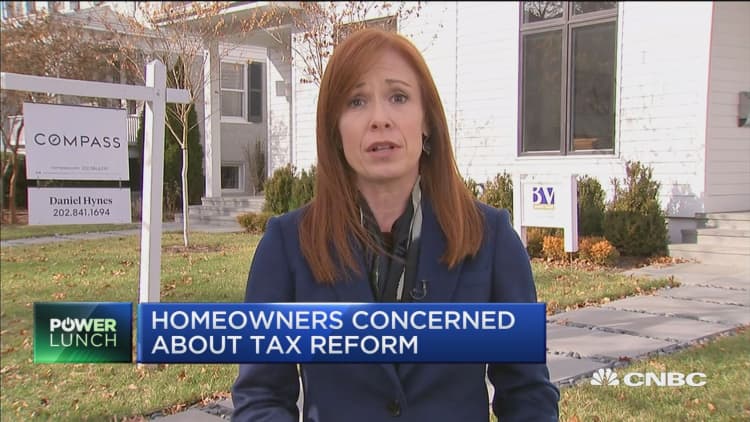
After the many twists and turns that the Republican tax-overhaul legislation has taken thus far, it might be unclear to homeowners what's in store for them.
In a nutshell, not much that will help them save more on taxes. The bill, expected to receive final approval by lawmakers on Wednesday, includes some changes that could make homeownership a more costly proposition for some taxpayers.
On top of making modifications to the mortgage interest deduction, the bill limits the deductibility of property taxes and state and local income taxes to a combined $10,000. In states such as New York and California where home prices and property taxes are high, this change means some homeowners could face bigger tax bills beginning next year.
And if you were thinking about prepaying some of your 2018 state and local income taxes to take advantage of current law, which is more generous, forget about it. The bill specifically disallows it.
However, it does not specifically ban early payment of property taxes.
In New Rochelle, New York, for example, where the average property tax bill tops $18,000, the city's 80,000 residents have been alerted that they can prepay the portion due in January (along with prepaying school district taxes due in April).
While the city's residents have been able to prepay in past years as well, the reminder this year is specifically due to the changes in the GOP tax bill.
"What we're telling residents is that we'll accept these prepayments but they should check with a financial advisor first," said Charles Strome, city manager for New Rochelle.
Aside from limiting the deductibility of property taxes, below are other aspects of the tax bill that impact homeowners. Keep in mind that the only way to take advantage of deductions related to homeownership is to itemize your tax returns.
And because the GOP tax bill roughly doubles the standard deduction for all taxpayers — i.e., it goes to $24,000 from $12,700 for married couples — the combined value of all your available deductions would need to exceed that new amount for itemizing to make sense.
Mortgage debt
If you already own a pricey home and it's your primary residence, you're in luck. Under the bill, homeowners who purchased a house before Dec. 15 of this year will be able to continue deducting the interest they pay on mortgage debt of up to $1 million.
For purchases after that date, the cap drops to $750,000. That amount of mortgage debt can be for a primary or secondary residence (i.e., a vacation house). Earlier versions of the bill would have eliminated the tax break for second homes.
The cap on mortgage interest reverts back to $1 million in 2026 regardless of when the home was purchased.
Home-equity debt
Interest paid on home-equity loans will no longer be deductible beginning in 2018, with no grandfathering in. In other words, if you already have a home-equity loan or line of credit, this is the last year you can write off the interest paid on it for a while.
(The exception is if you have a home-equity loan or second mortgage whose funds are used to substantially improve your home. In that case, according to the Tax Policy Center, the interest may still be deductible.)
In 2026, this provision will revert to current law, which allows a deduction for interest paid on up to $100,000 of home-equity debt.
Capital gains exclusion
Taxpayers will continue to be able to exclude up to $500,000 ($250,000 for single filers) from capital gains taxation when they sell their home, as long as they have lived there for two of the previous five years. Earlier versions of the tax bill would have imposed a more restrictive time frame.
More from Personal Finance:
Tax bill kills this key strategy for how you save for retirement


